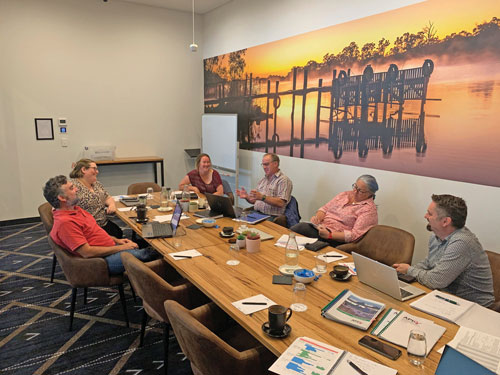ABOVE: Andrew Johnson, Cam Parker, Margo Andrae, Andrew Borgmeyer, Sofroni Eglezos, Andre Kings, the author, Charley-Rose Ford, Marianne Nelson and Ashley Barnes in front of the Mt Boothby Pastoral Co grow-out unit at Tintinara in South Australia.
The premier quality assurance program for pig producers in Australia is APIQ, with over 90 percent of Australian production adopting the program.
Australian Pork Limited manages the program on the industry’s behalf.
The APIQ standards are outcome-focused and supported by performance indicators, and annual certification provides customers with assurance that high standards are in place.
This applies to on-farm management, food safety, animal welfare, biosecurity and traceability.
This enables producers to deliver pigs of consistent quality to various markets and opens the door to domestic and export markets.
Australia faces an increasing risk of serious foreign diseases such as foot and mouth and African swine fever.
A biosecurity incursion of these diseases could have devastating implications for the Australian pork industry.
Commercial pork production systems require continuous movement of pigs through the supply chain to prevent animal health and welfare problems, and to realise their economic value.
In December last year, APL introduced the Animal Health Committee-endorsed Voluntary Enhanced Biosecurity Standards for African swine fever – a new verification option to APIQ that allows producers to demonstrate compliance.
Pork producers who have been verified against the VEBS will be better positioned to provide the assurances to jurisdictions that their biosecurity measures can:
- Protect against infection on-farm
- Reduce potential for spread off-farm
- Underpin approvals for movement permits in an emergency animal disease response.

Sofroni Eglezos, Charley-Rose Ford, Ashley Barnes, Andrew Borgmeyer, Marianne Nelson and Andre Kings in the Bridgeport Hotel boardroom at Murray Bridge in South Australia.
This helps maintain business continuity and alleviate potential animal welfare impacts.
Adoption of the VEBS will further support the pork industry’s leading position in biosecurity and EAD preparedness.
These voluntary standards aid to drive on-farm change, ensuring heightened safeguards against an EAD incursion and spread should one ever reach our shores.
On-farm compliance with the APIQ standards is verified through an independent audit system.
This ensures the credibility of the APIQ quality assurance program.
Aus-Meat is the contracted third-party auditing organisation conducting independent third-party annual compliance audits of all certified producers.
APL and Aus-Meat recently conducted a three-day APIQ auditor training program in regional South Australia to train and induct Charley-Rose Ford from the APL policy team and three new Aus-Meat auditors – Sofroni Eglezos from Brisbane Queensland, Marianne Nelson from Barossa South Australia and Ashley Barns from Perth Western Australia.
Mt Boothby Pastoral Co managing director and PorkSA chair Andrew Johnson hosted the training at production sites near Tintinara in South Australia.
APL chief executive officer Margo Andrae and producer relations director Cam Parker joined the group for the on-farm component.
APIQ auditor Andrew Borgmeyer walked the group through a mock desktop and on-farm audit assessment of both sites – demonstrating how to conduct the audit from start to finish.
Two days of classroom-based learning followed the on-farm audit assessment and was coordinated by the author.
Livestock Environmental and Planning’s Robyn Tucker and APIAM Animal Health’s Dr Sarah Jenkins presented to attendees on the APIQ environment, and animal health and welfare components of the standards.
Aus-Meat now have 13 active auditors in the field for the APIQ program, with nationwide coverage of sites across all major pig producing regions.
Pork producers wanting to learn more about APIQ and the Voluntary Enhanced Biosecurity Standards can reach out to the APIQ team at APL via australianpork.com.au/apiq or call 1800 789 099.







